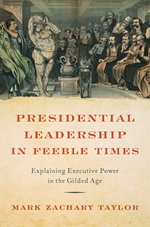Research
I. The President and the Economy
“The Economic Drivers of Political Time” Presidential Studies Quarterly 53: 29-46 (Mar 2023)
“A Political-Economic Theory of Political Time” American Political Science Association Annual Conference (Montreal, 2022)
“The Historical Presidency: The Gilded Age Presidents and the Economy” Presidential Studies Quarterly 51(4):860-883 (Dec 2021)
“Ideas and Their Consequences: Benjamin Harrison and the Seeds of Economic Crisis, 1889-1893” Critical Review 33(1):102-127 (Mar 2021)
“An Economic Ranking of the US Presidents, 1789-2009: A Data-Based Approach” PS: Politics & Political Science 45(4):596-604 (Oct 2012)
[click here for: Data and Methods Appendixes].
“Theodore Roosevelt, Politics, and the Panic of 1907” Midwest Political Science Association Annual Conference (Chicago, 2017)
“Warren Harding and Presidential Leadership: The 1920s Economic Boom and the Politics of Normalcy” Midwest Political Science Association Annual Conference (Chicago, 2018)
II. How and Why do Nations Innovate?
The Politics of Innovation: Why Some Countries Are Better Than Others at Science & Technology (Oxford University Press, 2016)
“Toward an International Relations Theory of National Innovation Rates” Security Studies 21(1):113-151 (March 2012). Appendix
“Does Culture Still Matter?: The Effects of Individualism on National Innovation Rates” Written with Sean P. Wilson. Journal of Business Venturing 27:234-247 (Jan 2012).
“Intellectual Property Protection and U.S. Foreign Direct Investment in Emerging Economies” Written with James Mitchell Watkins. Journal of Intellectual Property Rights 15(6):415-428 (Nov 2010)
“Federalism and Technological Change in Blood Products” Journal of Health Politics, Policy and Law, 34(6): 863-898 (Dec 2009)
“International Linkages and National Innovation Rates: An Exploratory Probe” Review of Policy Research 26(1-2):127-149 (Jan/Mar 2009).
“International Political Economy: The Reverse Salient of Innovation” Review of Policy Research 26(1-2):219-223 (Jan/Mar 2009).
“Podcast Lectures as a Primary Teaching Technology: Results of a One-Year Trial” Journal of Political Science Education 5(2):135-153 (2009)
“Political Decentralization and Technological Innovation: Testing The Innovative Advantages of Decentralized States” Review of Policy Research 24(3):231-257 (May 2007)
“Empirical Evidence Against Varieties of Capitalism’s Theory of Technological Innovation” International Organization 58(3):601-631 (Summer 2004)
III. Public Policy Articles
“Economic Security: Expanding Women’s Participation in US Science” with Sue V. Rosser, Harvard International Review 30(3): 20-24 (Fall 2008)
“Dominance Through Technology” Foreign Affairs 74(6) (Nov/Dec, 1995)
IV. Book Chapters
“Patents” in Science and Politics. Ed. Brent Steel pp. 423-428 (Sage/CQ Press, 2014).
“Broadband Enabled Innovation” written with Michael Best in Trends in Telecommunication Reform 2012: Smart Regulation for a Broadband World. (International Telecommunications Union, 2012).
“The Political Economy of National Leadership in Science and Technology” in Leadership in Science and Technology: A Reference Handbook. Ed. William Bainbridge (Sage Publications, 2011).
“Politics and the Science of Science Policy” written with Harvey Sapolsky in Handbook of Science of Science Policy eds. John H. Marburger III, Kaye Husbands Fealing, Julia Lane, Bill Valdez, & Stephanie Shipp. (Stanford University Press, 2011).
“Regression Analysis” (unedited version) in 21st Century Political Science: A Reference Handbook. Eds. John Ishiyama and Marijke Breuning pp. 478-489 (Sage Publications, 2010).

